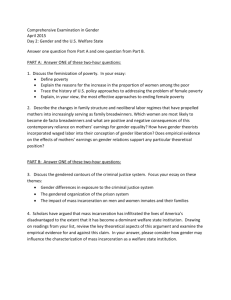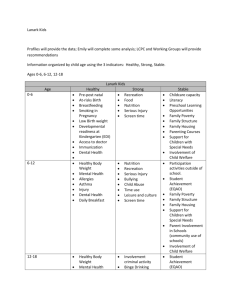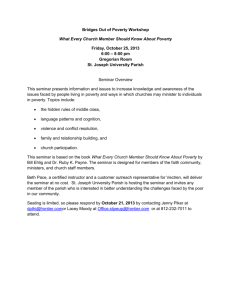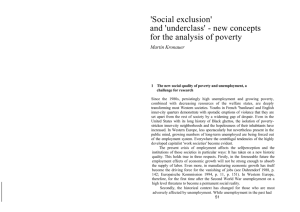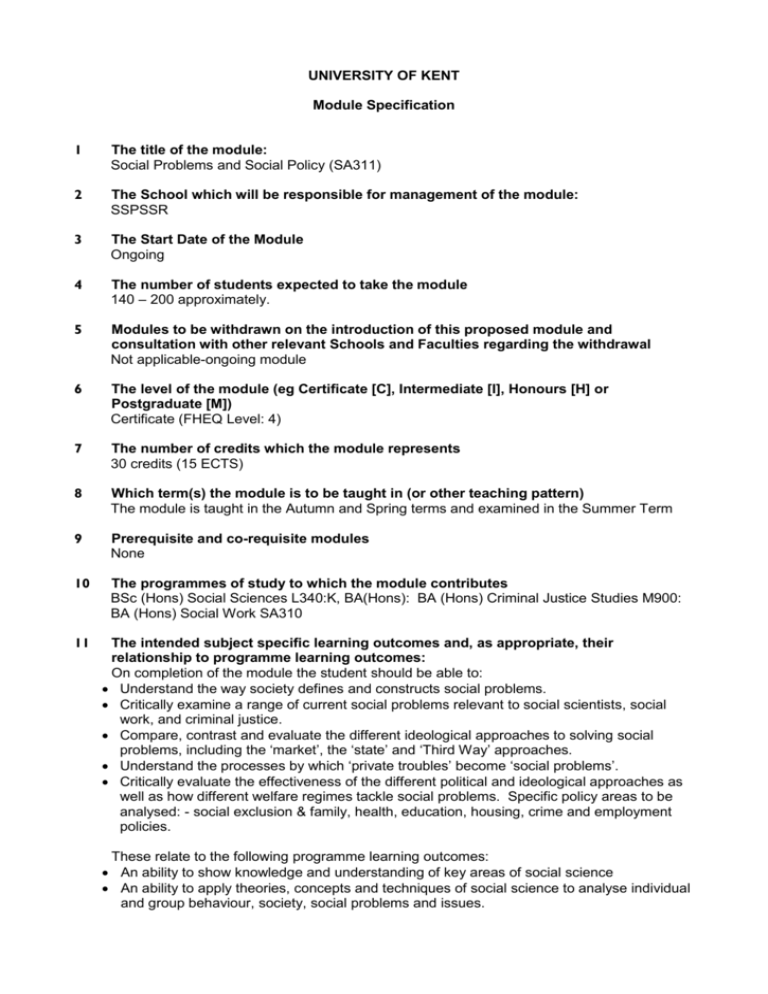
UNIVERSITY OF KENT
Module Specification
1
The title of the module:
Social Problems and Social Policy (SA311)
2
The School which will be responsible for management of the module:
SSPSSR
3
The Start Date of the Module
Ongoing
4
The number of students expected to take the module
140 – 200 approximately.
5
Modules to be withdrawn on the introduction of this proposed module and
consultation with other relevant Schools and Faculties regarding the withdrawal
Not applicable-ongoing module
6
The level of the module (eg Certificate [C], Intermediate [I], Honours [H] or
Postgraduate [M])
Certificate (FHEQ Level: 4)
7
The number of credits which the module represents
30 credits (15 ECTS)
8
Which term(s) the module is to be taught in (or other teaching pattern)
The module is taught in the Autumn and Spring terms and examined in the Summer Term
9
Prerequisite and co-requisite modules
None
10
The programmes of study to which the module contributes
BSc (Hons) Social Sciences L340:K, BA(Hons): BA (Hons) Criminal Justice Studies M900:
BA (Hons) Social Work SA310
11
The intended subject specific learning outcomes and, as appropriate, their
relationship to programme learning outcomes:
On completion of the module the student should be able to:
Understand the way society defines and constructs social problems.
Critically examine a range of current social problems relevant to social scientists, social
work, and criminal justice.
Compare, contrast and evaluate the different ideological approaches to solving social
problems, including the ‘market’, the ‘state’ and ‘Third Way’ approaches.
Understand the processes by which ‘private troubles’ become ‘social problems’.
Critically evaluate the effectiveness of the different political and ideological approaches as
well as how different welfare regimes tackle social problems. Specific policy areas to be
analysed: - social exclusion & family, health, education, housing, crime and employment
policies.
These relate to the following programme learning outcomes:
An ability to show knowledge and understanding of key areas of social science
An ability to apply theories, concepts and techniques of social science to analyse individual
and group behaviour, society, social problems and issues.
Understand the contribution of social science to explaining and understanding social
problems
12
The intended generic learning outcomes and, as appropriate, their relationship to
programme learning outcomes:
On completion of the module students should be able to:
Use the methods of social sciences to analyse the causes and consequences of social
problems (Key Skill 6)
Communicate information and analysis in written and oral form using relevant IT packages
(Key Skills 1 & 3)
Analyse and interpret social science statistics and data and present their findings in a
relevant form for their audience (Key Skill 2)
Assess and evaluate the Government’s policies for resolving social issues and problems
(Key Skill 6)
Debate and discuss the various policy options and reach balanced conclusions on the
basis of the evidence (Key Skills 4 & 6)
Work with other students to prepare presentations and discuss their ideas in seminars (Key
Skill 4)
These contribute to programme level learning outcomes -Demonstrate an ability to develop
a strong line of argument both verbally and in writing (Key Skills 1 & 5)
Compare and contrast the strengths and weaknesses in the arguments and opinions of
others (Key Skill 6)
Engage in and take a pro-active role in seminar discussion (Key Skills 1, 4 & 5)
13
A synopsis of the curriculum
Social Problems: construction and definition: role of politicians, pressure groups, media and
the public.
Ideological approaches to social problems-Conservative, New Right, Social Democratic,
Marxist, Feminist, Environmental approaches. ‘State’, ‘Market’ or ‘Third Way’ approaches.
Welfare Regimes – The Impact of globalisation on UK Policy Making
Poverty, Social Exclusion & Social Mobility: measuring poverty and social exclusion,
relation to inequality, debates concerning the extent of the ‘underclass’: dependency
culture, cycle of deprivation, policies to reduce poverty and social exclusion. Issues &
current debates of Welfare Reform
Homelessness: definition of homelessness,’ rough-sleeping’, policies to reduce
homelessness and rough-sleeping, social consequences of homelessness, need for
affordable housing.
Inner City Deprivation: problems of the inner cities, attempts to tackle the problems and the
role of local, central government, business, commerce, voluntary bodies.
Health & The Ageing Population: A Social problem? Care in the community, policies for the
elderly, ageism. Impact of Health Reforms.
Family Policies: Role of the family: work/life balance, role of employment, welfare to work,
New Deal. Child Support Agency: impact on children and families, Teenage Pregnancy.
Child Protection Policies
Juvenile Crime: Concept of juvenile crime. Models: treatment, welfare, justice. Truancy and
Exclusion, role of the family, ASBOS, curfews, Neighbourhood Watch. Role of prisons.
Privatisation of Prisons.
UK Drug Policies
Education Policies:
Mental Health: Perceptions of mental health. Models of causation: environment, culture,
family dynamics. Types of intervention. Alternative models of care. Community Care.
Constructing and Reconstructing Social Problems.
14
Indicative Reading List
Alcock P et al. (2008) Social Policy in Britain (3rd Ed) Palgrave Macmillian
Alcock P ed. (1999) Social Work and Social Care. The Gildredge Press Limited.
Baggott R. (2004) (3rded) Health & Health Care In Britain. Palgrave Macmillian
Baldock J, Manning N, Vickerstaff S.(2007) (3rd Ed) Social Policy. Oxford University Press
Bochel H, Page R, Sykes R. (2005) Social Policy: Issues and Developments. Pearson,
Prentice Hall
J. Fink (2004) Care
J. Flaherty et al (2004) Poverty: The Facts
Fitzpatrick T (2001) Welfare Theory, An Introduction.Palgrave
Hale C, Hayward K, Wahidin A, Wincup (Eds) (2005) Criminology. Oxford University Press
Kirton D. (2009) Child Social Work, Policy & Practice. Sage
Lavelette M & Pratt A. Eds (2007) (3rd Ed) Social Policy, Theories, Concepts and Issues.
Sage
May M, Page R, Brunsdon E. (eds) (2001) Understanding Social Problems. Blackwell
Mooney G (2004) Work. Open University Press
J. Muncie & E. McLaughlin (eds) (2002) The Problem of Crime. Sage Publications
Page R. (2007 Revisiting the Welfare State. Open University Press
Pierson C (2006) (3rd Ed) Beyond The Welfare State. Polity
Peckham S & Meerabeau L (2007) (2nd Ed) Social Policy for Nurses, and the Helping
Professions.
Open University Press
Ridge T & Wright S. (2008) Understanding Inequality, Poverty & Wealth – Policies &
prospects.
Policy Press
R. Lister ed.(1996) Charles Murray and the Underclass
R. Lister (2004) Poverty
Taylor G. (2007) Ideology & Welfare. Palgrave Macmillan
15
Learning and Teaching Methods, including the nature and number of contact hours
and the total study hours which will be expected of students, and how these relate to
achievement of the intended learning outcomes
The Module’s contact hours are 44 comprising 22 weekly one hour lectures and 22 weekly
one hour seminars. The total hours for the Module are 300. For Social Work students 11
weekly one hour lectures and 11 weekly seminars. The lectures examine key concepts,
theories and policies concerning social problems and social policy. Social work students will
receive similar but with a social work emphasis. The seminars are student-centred and focus
on discussions and presentations to enable discussion and critical evaluation of current
issues and problems. Case studies, readings, guest speakers, use of film and news reports
will be used to illustrate and discuss current problems and social policies.
Students are be expected to study for up to 11 hours a week in addition to the class contact
time.
16
Assessment methods and how these relate to testing achievement of the intended
learning outcomes
Assessment will be by coursework (50%) and unseen written examination (50%)
Coursework assessments take the form of one essay, and one report on a chosen social
policy topic area. Students will be expected to gather evidence from people involved in a
social policy area of their choice. Students will also be assessed on their seminar
participation which will include a very short seminar presentation, their contributions to the
seminar and their attendance. Essay 1 = 20%, Report = 20% and Seminar Participation +
10%. The examination gives students a choice of 4 questions out of 12 to be answered in 3
hours.
These methods ensure that students develop communication skills and show understanding
of the current debates and discussions in social policy.
17
Implications for learning resources, including staff, library, IT and space
The module is already running and library resources, including books and journals have been
built up. The new criminal Justice Studies degree will mean that more copies of key library
books should be ordered.
As far as can be reasonably anticipated, the curriculum, learning and teaching
methods and forms of assessment do not present any non-justifiable disadvantage to
students with disabilities
The methods of teaching and assessment does not disadvantage students with disabilities.
Hearing loops are provided in the new University of Kent buildings at the Pembroke site. The
new SSPSSR building should provide the space to accommodate the students on the
course.
Statement by the Director of Learning and Teaching: "I confirm I have been consulted on the
above module proposal and have given advice on the correct procedures and required content of
module proposals"
................................................................
Director of Learning and Teaching
..............................................
Date
Statement by the Head of School: "I confirm that the School has approved the introduction of the
module and will be responsible for its resourcing"
.................................................................
Head of School
..............................................
Date





